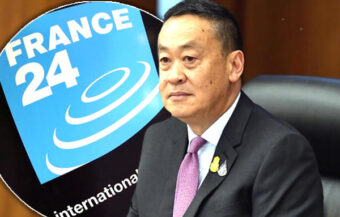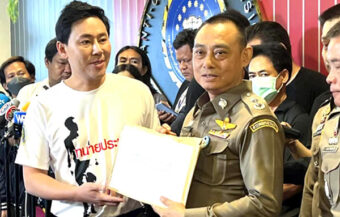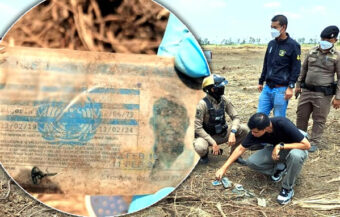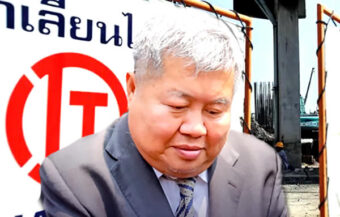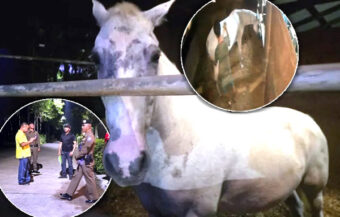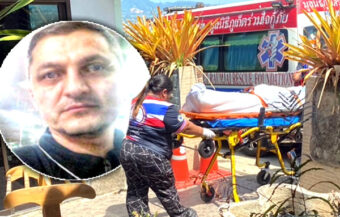An American, a convicted drug trafficker, traces his redemption and good fortune to a decision one day to be the happiest person in the prison. He not only survived what is for some, a death sentence but also, in short order, became a free man, a stronger man and one with a mission. Thai prisons have a significant mortality rate for those serving long sentences.
Next week, the story of an American who spent five years in Thai prison and who survived an ordeal that saw him facing a death sentence and finally a jail term of 104 years, will be published by National Geographic Channel, the paid-for TV channel coast to coast. The inspiring story shows how Jesse Moskel’s response to his predicament, at its darkest point, transformed his life and put him on the right path.
The story of the 44-year-old American who now runs a PR and advertising business in the city of Columbia in South Carolina is about to become national news in the United States next week when featured by TV channel National Geographic. It is another inspiring story of a western man who finds himself, after plumbing the depths of the despair and the nightmare of being locked up for life in a Thai prison.
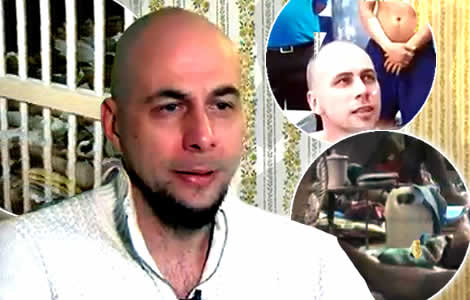
Speaking just 13 months after his eventual release from prison in 2014, Jesse Moskel described how the despair he felt at that point was the jolt he needed to turn his life around even with no firm prospect of ever seeing the world outside the walls of the prison again.
He described his life and thinking as ‘head trash’ up to that point resulting in an aimless life that just went round in circles.
Telecoms salesman bored with life
The start of the US man’s story was back in 2006 when he was 30 years old working as a salesman for a large telecoms company in the states.
With no stamps on his passport and the humdrum tedium of daily life, just paying the bills, Jesse wanted a change. That change resulted in him leaving home to teach English in South Korea.
Began smoking marijuana with beers on weekends
The change of scenery soon saw Jesse getting into the habit of smoking marijuana on weekends with beers. This gradually progressed to ecstasy pills and what he described as a heavy party scene.
It wasn’t long before the fun-loving American was selling drugs to fellow teachers and not long after that, he found himself ‘bouncing around Southeast Asia’ with drugs in his suitcase. Jesse Moskel had become a drug trafficker.
Downfall in Pattaya as Thai police catch a scent
That was until Jesse landed in Thailand. It was in Pattaya, Asia’s party city where Thai police got wind of two characters with links to drug trafficking. Jesse was arrested with drugs in his case and lodged in a Thai jail cell with over 40 other inmates.
Later he recalled the scene vividly: ‘Most people don’t come to Thailand for the men but that’s who I was with. There was a lot of men, it was crowded, it was stinky and there was one toilet.’
Jesse also recalls that it ‘was a hot situation’ with no air conditioning, something most westerners never experience in Thailand until things go wrong.
Bewildered, no phone calls home and a three-page official document written in ‘cake frosting’ script
Bewildered and confused as he did not then speak the language, Jesse also found that there was no way of contacting his loved ones or family back home. No one cared. After two days of rising alarm, he was already worried.
He had been handed a document written in Thai. It was three pages with Thai writing which Jesse recalled at the time looked to him like cake frosting back home in the USA.
A Thai man, who spoke and read English, delivered the shockingly bad news to a man already in hell
Finally, another prisoner was injected into the population. A Thai man who seemed to be able to speak English. Jesse asked the man to explain the charges and the meaning of the document to him.
He recalls the man reading it for some time carefully and shaking his head. The man then looked up at him and again slowly shook his head and said: ‘You, my friend, are never going home from this prison.’
Locked up in Bang Kwang prison
The prison was the notorious Bang Kwang or ‘Big Tiger’ because of its well-deserved reputation for eating inmates alive with poor hygiene, appalling food, harsh conditions and chronic overcrowding. The site of Thailand’s execution chamber is a huge complex that houses over 6,000 inmates.
Jesse Moskel found himself living for years in a room 15ft by 30ft with 71 other inmates sleeping on the ground and sharing one toilet.
Among the prison population, his status as a drug dealer put him at the bottom of the pile. ‘They believe that a drug dealer is worse than a prisoner and they treat them that way,’ he recalled.
Initially facing the death sentence
Jesse was facing two very serious charges, one carrying the death penalty and the other, a lesser charge with a potential four-year term. Even if spared the death penalty, he was facing a lifetime in prison and that in itself would take costly legal representation.
One year later, after spending all his money on lawyers, Jesse Moskel’s finally determined sentence was reduced to one hundred and four years. A result. Fortunately, it was later reduced again to twenty-seven years in prison.
People don’t admit it, but there are uplifting moments of comfort inside a grim Thai prison
Even during this ordeal, however, Jesse found himself adapting to the situation. He readily admits what most people don’t acknowledge and that is that there are ways of coping with an ordeal like the nightmare he found himself in and at times, there were even some high points and things that happened that gave him comfort.
The turning point – a decision to be happy
The turning point for the American was one day when he decided that he was determined to be happy and break away from the negativity of many of the people about him.
He set himself the target of being the happiest person in his cell and the prison for that one day.
It worked. The American says not only did he feel better but through repeatedly practising this, he attracted other people towards him who had a more positive mindset. Even among the criminals, murderers and rapists, there were some.
Turned to God and not to crime
The American also faced the choice of which direction he would take with his life from that point. That is when he decided to recommit to God and religion rather than the other path which led to more illegal activity.
The American also began to read and was helped by his brother in the United States who sent him books and in particular, reading material on direct marketing and copywriting. There was a reason for this.
Iranian who had become a millionaire behind bars in Thailand with his refined mailing racket
At this time, Jesse had met a character in the prison from Iran. This Iranian inmate had approximately ฿3 million in his bank account that he earned exclusively while behind bars.
The Iranian had developed and perfected a letter sent by mail to charities, non-government organisations and a growing mailing list of people who regularly sent him financial handouts. Jess recalls that the man would never let anyone see or review his letter.
Jesse was baptised after 1 year
This prompted the American to begin his own letter-writing campaign. He wrote to the American Embassy and other support organisations seeking help.
He learned to speak and write in Thai while also helping to set up small churches and congregations in each of the buildings within the prison and later in other institutions when he was transferred.
Within one year of being imprisoned, Jesse was baptised and later went on to baptise others within the Thai prison system.
It should be noted that when the Thai military junta came to power in 2014 when Jesse was already a free man in the United States, there was a reported tightening of prison conditions and discipline within the prison system including restrictions on reading materials and external communication.
Thai prison and honing the art of communication
Jesse later told an email marketing podcast from America that he refined his ability to write copy, communicate effectively and succinctly within prison not only for writing letters to outside agencies and American consular officials but also to make the most of rare prison visits which were cut short after 20 to 30 minutes by prison officials.
During this time, Jesse referred to his address not as a prison but as something different. ‘I refused to call the place I was living for three years of the five Ban Bat prison I called it Ban Bat Mh̄āwithyālạy which means University,’ he told US TV last week.
The arduous task of handling prison visits
The American recalls the clamour and bustle of such visits where he would have to communicate with the other person through a glass window, bars, a perimeter distance and then chicken wire.
He would have to shout to his visitor to be heard. This required clinical preparation to make sure that his visitor understood his message and so that the visit was not wasted.
A man from the American Embassy with a smile
Jesse’s breakthrough came in 2013, five years after the prison door shut behind him leaving him facing the reality that his former life was gone.
A senior American official from the US Embassy turned up for an unannounced visit, the first of its kind.
Jesse recalled the man and how it happened when speaking to American TV station WIS 10 this week: ‘It was entirely unexpected,’ he explained. ‘The embassy just doesn’t visit prisoners in Thailand. But this guy came down without his entourage and he was actually smiling and it was covered in red ink on both sides.’ He was referring to one of his letters.
The news was indeed good. It could not have been much better. Jesse was being repatriated to the United States under the treaty between America and Thailand for the exchange of prisoners.
The greatest miracle of all left Jesse lost for words in an LA prison 2 months after getting home
However, only 2 months after that when the American had been flown back home and was serving out the remaining twenty-two years of his sentence in Los Angeles, there came the greatest miracle of all.
Again, without notice, the American was told one day by prison authorities that senior officials had reviewed his case and that based on American sentencing policy, he was being released from prison with time served.
Speaking 14 months later, Jesse recalls being lost for words at hearing that news.
The American soon found himself descending two steps outside the prison facility and recalls the sunshine hitting his eyes. ‘I stepped out of the prison and the sun just hit me and it was like the first time I had seen the sun in years,’ Moskel told the local TV channel last Friday.
Jesse has talked about his dream of someday returning to Thailand and ministering to inmates in Thai prisons. ‘I will go back to Thailand one day, if there’s any redemption to be found at all, it’s hopefully in saving someone’s life,’ he said.
4-day greyhound bus ride home – conflicting emotions and the real-life challenges ahead of him
On his release from prison in 2013, there followed a 4-day bus ride on a Greyhound bus from the West Coast to the East where the American had time to consider his position.
He recalls being daunted within 24 hours of his release at the prospect of picking up life again at home and also conflicted about what to say about his time in prison.
On one hand, he felt deep shame but on the other hand, his experience had taught him how lucky he had been. He kept observing that he really should still be in prison for at least another twenty years.
This was a second chance but you don’t exactly inspire confidence by telling your prospective clients as a copywriter that you’ve been imprisoned for international drug trafficking.
‘We don’t put drugs in prison, we put people in prison’ says Moskel who warns of drug use
That was six years ago and today Jesse Moskel is running a thriving PR and advertising business.
Thirteen months after his release, Jesse was giving public speeches to young people for free about the dangers of drugs or a party lifestyle but also feels that society has to understand the drug problem better.
‘The truth is that we don’t put drugs in prison, we put people in prison,’ he says about the war on drugs. He says that: ‘life is short, things happen to us in life but these things are not us.’
Join the Thai News forum, follow Thai Examiner on Facebook here
Receive all our stories as they come out on Telegram here
Follow Thai Examiner here
Further reading:
Drugs leave Thai prisons chronically overcrowded with 87% of female prisoners jailed for meths
Norwegian killer accepts he’s going to Thai prison after violent killing of UK man at Phuket hotel
More foreign nationals in Thai prison but there are conflicting reports on harsh conditions








